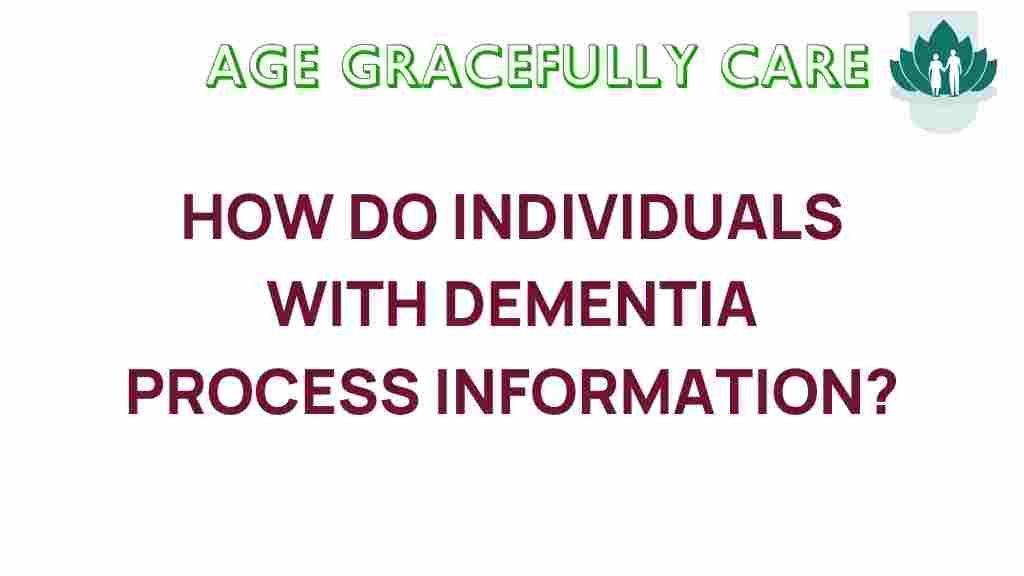Unlocking the Mind: How Do Individuals with Dementia Process Information?
Dementia is a complex neurodegenerative condition that affects millions of individuals worldwide, particularly the elderly. Understanding how individuals with dementia process information is crucial for caregivers, healthcare providers, and families. By unlocking the mind’s potential, we can enhance communication, improve caregiving strategies, and promote better mental health for those affected.
Understanding Dementia and Cognitive Processing
Dementia involves a decline in cognitive processing abilities, affecting memory, reasoning, and the ability to perform daily activities. As the brain undergoes neurodegeneration, the way individuals process information changes significantly. Here’s a closer look at these changes:
- Memory Loss: Individuals with dementia often experience challenges with both short-term and long-term memory. They may forget recent conversations or important dates.
- Difficulty with Language: Communication becomes challenging due to struggles with finding the right words or understanding complex sentences.
- Impaired Judgment: Decision-making can be affected, leading to difficulties in assessing situations or understanding consequences.
- Visual-Spatial Difficulties: Many individuals may struggle with visual memory and navigation, making it hard to recognize familiar places.
These cognitive processing changes can lead to frustration and challenges in daily life, making it essential for caregivers to adapt their approaches.
How Dementia Affects Memory and Communication
Dementia impacts various types of memory, each playing a role in cognitive processing:
- Working Memory: This short-term memory is crucial for daily tasks. Individuals may struggle to hold onto information long enough to use it.
- Declarative Memory: This type of memory involves facts and events. Individuals may find it difficult to recall names or recent experiences.
- Procedural Memory: This is the memory of how to perform tasks. Interestingly, some procedural memories can remain intact even as other types decline.
Communication is also significantly affected. Caregivers need to adapt their communication strategies to ensure they connect effectively with individuals suffering from dementia. Here are some tips:
- Use simple language and short sentences.
- Maintain eye contact and use non-verbal cues.
- Be patient and give the individual time to respond.
- Avoid overwhelming them with too much information at once.
Step-by-Step Process for Enhancing Communication with Individuals with Dementia
Enhancing communication with individuals affected by dementia involves a thoughtful approach. Here’s a step-by-step process:
- Establish a Comfortable Environment: Create a calm and familiar setting that minimizes distractions.
- Engage in Active Listening: Show genuine interest in what they’re saying, even if it seems disjointed.
- Use Visual Aids: Incorporate pictures, objects, or written words to reinforce understanding.
- Encourage Reminiscence: Discuss familiar topics or past experiences that may evoke positive memories.
- Be Mindful of Non-Verbal Communication: Pay attention to body language and facial expressions. They can convey emotions and understanding.
Challenges in Cognitive Processing and Caregiving
Caregivers often face challenges in understanding and adapting to the cognitive processing changes associated with dementia. Here are some common hurdles:
- Emotional Strain: Caregiving can be emotionally taxing, leading to burnout. It’s crucial for caregivers to take breaks and seek support.
- Communication Barriers: Misunderstandings can occur, leading to frustration for both parties.
- Behavioral Changes: Individuals with dementia may exhibit mood swings or aggression, complicating caregiving efforts.
- Lack of Resources: Many caregivers feel unprepared and lack access to proper training or resources.
Troubleshooting Tips for Caregivers
To navigate the challenges of caregiving for someone with dementia, consider these troubleshooting tips:
- Educate Yourself: Learn about dementia and cognitive processing to better understand the condition.
- Utilize Support Networks: Join support groups or forums to connect with other caregivers and share experiences.
- Practice Self-Care: Prioritize your mental health by engaging in activities you enjoy and ensuring you have time to recharge.
- Seek Professional Guidance: Consult with healthcare professionals for tailored advice and strategies.
The Importance of Brain Health in Dementia
Maintaining brain health is essential for individuals with dementia and can help slow the progress of cognitive decline. Here are some strategies to promote brain health:
- Engage in Mental Activities: Puzzles, reading, and memory games can stimulate cognitive function.
- Physical Exercise: Regular physical activity is linked to better brain health and can improve overall well-being.
- Healthy Diet: A balanced diet rich in fruits, vegetables, whole grains, and healthy fats supports brain function.
- Stay Socially Active: Engaging with family and friends can help maintain cognitive function and improve mental health.
For more detailed information on brain health and its impact on dementia, visit the Alzheimer’s Association website.
Conclusion: Embracing the Journey of Dementia Care
Understanding how individuals with dementia process information is vital for effective caregiving and improving their quality of life. By recognizing the challenges of cognitive processing, memory, and communication, caregivers can adapt their approaches and provide meaningful support. Emphasizing brain health and self-care for caregivers is equally important, ensuring a healthier environment for both the individual with dementia and their caregiver.
As we continue to learn about dementia and its effects, we can foster a more compassionate and understanding society. By unlocking the mind, we enhance communication, support mental health, and improve the overall experience of elderly care. Together, we can navigate the journey of dementia with grace and dignity.
For additional resources and support, check out our caregiving resources page.
This article is in the category Health and created by AgeGracefullyCare Team
